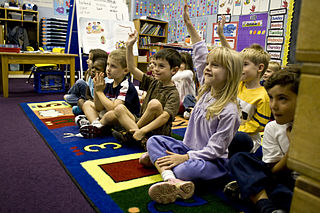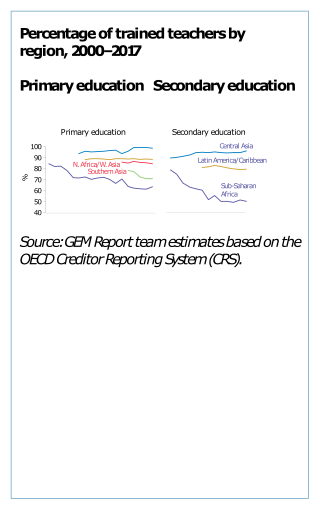
A teacher, also called a schoolteacher or formally an educator, is a person who helps students to acquire knowledge, competence, or virtue, via the practice of teaching.

Kindergarten is a preschool educational approach based on playing, singing, practical activities such as drawing, and social interaction as part of the transition from home to school. Such institutions were originally made in the late 18th century in Germany, Bavaria and Alsace to serve children whose parents both worked outside home. The term was coined by German pedagogue Friedrich Fröbel, whose approach globally influenced early-years education. Today, the term is used in many countries to describe a variety of educational institutions and learning spaces for children ranging from two to six years of age, based on a variety of teaching methods.
A Bachelor of Education is an undergraduate academic degree which prepares students for work as a teacher in schools. A Bachelor of Education program typically lasts three to four years and combines both coursework and practical experience in educational settings. The curriculum is designed to provide foundational knowledge in pedagogy, educational psychology, teaching methodologies, and subject-specific training. Graduates of this program are equipped with the skills necessary to foster a supportive and effective learning environment for their students.

Education in England is overseen by the Department for Education. Local government authorities are responsible for implementing policy for public education and state-funded schools at a local level. State-funded schools may be selective grammar schools or non-selective comprehensive schools. All state schools are subject to assessment and inspection by the government department Ofsted. England also has private schools and home education; legally, parents may choose to educate their children by any suitable means.

Childcare, also known as day care, is the care and supervision of one or more children, typically ranging from two weeks to 18 years old. When describing a business class, 'daycare' is usually written as a single word. Although most parents spend a significant amount of time caring for their child(ren), childcare typically refers to the care provided by caregivers who are not the child's parents. Childcare is a broad topic that covers a wide spectrum of professionals, institutions, contexts, activities, and social and cultural conventions. Early childcare is an important and often overlooked component of child development.

A preschool, also known as nursery school, pre-primary school, play school or creche, is an educational establishment or learning space offering early childhood education to children before they begin compulsory education at primary school. It may be publicly or privately operated, and may be subsidized from public funds. The typical age range for preschool in most countries is from 2 to 6 years.
Special education is the practice of educating students in a way that accommodates their individual differences, disabilities, and special needs. This involves the individually planned and systematically monitored arrangement of teaching procedures, adapted equipment and materials, and accessible settings. These interventions are designed to help individuals with special needs achieve a higher level of personal self-sufficiency and success in school and in their community, which may not be available if the student were only given access to a typical classroom education.
An academic term is a portion of an academic year during which an educational institution holds classes. The schedules adopted vary widely. Specific synonyms are commonly used to denote the duration or a term. In most countries, the academic year begins in late summer or early autumn and ends during the following spring or summer.

The Republic of Austria has a free and public school system, and nine years of education are mandatory. Schools offer a series of vocational-technical and university preparatory tracks involving one to four additional years of education beyond the minimum mandatory level. The legal basis for primary and secondary education in Austria is the School Act of 1962. The Federal Ministry of Education is responsible for funding and supervising primary, secondary, and, since 2000, also tertiary education. Primary and secondary education is administered on the state level by the authorities of the respective states.
A preschool teacher is a person who is employed to care for children from infant to 4 years of age in a daytime setting. “Preschool“ is the category for children aged 2 to 4 years of age.

Teacher education or teacher training refers to programs, policies, procedures, and provision designed to equip (prospective) teachers with the knowledge, attitudes, behaviors, approaches, methodologies and skills they require to perform their tasks effectively in the classroom, school, and wider community. The professionals who engage in training the prospective teachers are called teacher educators.
A substitute teacher is a person who teaches a school class when the regular teacher is absent or unavailable; e.g., because of illness, personal leave, maternal leave and so on. "Substitute teacher" is the most commonly used phrase in the United States, South Africa, Canada, India and Ireland, while supply teacher is the most commonly used term in Great Britain and the Canadian provinces of Ontario and New Brunswick. The term cover teacher is also used in Great Britain. Common synonyms for substitute teacher include relief teacher or casual relief teacher and "emergency teacher". Other terms, such as "guest teacher", are also used by some schools or districts. Regional variants in terminology are common, such as the use of the term teacher teaching on call (TTOC) in the Canadian province of British Columbia and occasional in Ontario.
Education in Jamaica is primarily modeled on the British education system.

Education in Ethiopia was dominated by the Ethiopian Orthodox Church for many centuries until secular education was adopted in the early 1900s. Prior to 1974, Ethiopia had an estimated literacy rate below 50% and compared poorly with the rest of even Africa in the provision of schools and universities. After the Ethiopian Revolution, emphasis was placed on increasing literacy in rural areas. Practical subjects were stressed, as was the teaching of socialism. By 2015, the literacy rate had increased to 49.1%, still poor compared to most of the rest of Africa.

A certified teacher is an educator who has earned credentials from an authoritative source, such as a government's regulatory authority, an education department/ministry, a higher education institution, or a private body. This teacher qualification gives a teacher authorization to teach and grade in pre-schools, primary or secondary education in countries, schools, content areas or curricula where authorization is required. While many authorizing entities require student teaching experience before earning teacher certification, routes vary from country to country.
A paraprofessional educator, alternatively known as a paraeducator, para, instructional assistant, educational assistant, teacher's aide or classroom assistant, is a teaching-related position within a school generally responsible for specialized or concentrated assistance for students in elementary and secondary schools.
Teaching in Victoria, Australia is regulated by the Victorian Institute of Teaching, through the Department of Education and Training (DET), which is part of the State Government. The DEECD is biggest operator of schools in the state, and along with the independent and Catholic school systems have an interest in teaching as the operator of schools and employer of teachers.

The Education Act 2011 is an Act of the Parliament of the United Kingdom. It was the first major piece of education legislation to be introduced by the coalition government, and makes changes to many areas of educational policy, including the power of school staff to discipline students, the manner in which newly trained teachers are supervised, the regulation of qualifications, the administration of local authority maintained schools, academies, the provision of post-16 education, including vocational apprenticeships, and student finance for higher education.

In March 2020, nurseries, schools, and colleges in the United Kingdom were shut down in response to the COVID-19 pandemic. By 20 March, all schools in the UK had closed for all in-person teaching, except for children of key workers and children considered vulnerable. With children at home, teaching took place online. The emergence of a new variant of COVID-19 in December 2020 led to cancellation of face-to-face teaching across England, Northern Ireland, Scotland, and Wales the following month.

On 12 March 2020, all schools, colleges, and childcare facilities in the Republic of Ireland were shut down in response to the COVID-19 pandemic. The shutdown resulted in the cancellation of the 2020 Leaving Certificate and 2020–2021 Junior Certificate examinations, as well as all 2020–2021 Irish language summer courses in the Gaeltacht.











